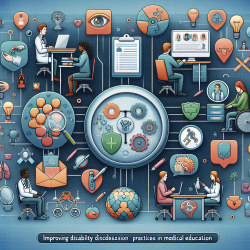Introduction
Professionalism is a cornerstone of medical education and practice. However, identifying and addressing unprofessional behavior early in a student's career can be challenging. A recent study titled Student response to reports of unprofessional behavior: assessing risk of subsequent professional problems in medical school explores the effectiveness of Early Concern Notes (ECNs) in predicting and mitigating future professional issues. This research provides valuable insights for educators and practitioners aiming to foster a professional learning environment.
Understanding Early Concern Notes (ECNs)
The ECN program, as detailed in the study, serves as an early-warning system designed to identify, counsel, and intervene when students exhibit unprofessional behavior. The program categorizes student responses to ECNs based on their recognition of inappropriate behavior and acceptance of responsibility. This classification helps identify students at risk of repeated lapses and adverse academic events.
Key Findings from the Research
- Students who acknowledged their inappropriate behavior and accepted responsibility were less likely to receive subsequent ECNs (14-19%) compared to those who resisted or denied responsibility (36-59%).
- Students with limited insight and adaptability were at the highest risk of repeated professional lapses and adverse academic events.
- 71% of students with three or more ECNs encountered adverse academic events, indicating a strong correlation between repeated unprofessional behavior and academic challenges.
Implications for Practitioners
For practitioners and educators, these findings underscore the importance of fostering an environment that encourages self-reflection and accountability. Here are some actionable steps based on the research:
- Implement ECNs: Adopt an ECN system to provide timely feedback and support to students exhibiting unprofessional behavior.
- Focus on Reflection: Encourage students to reflect on their actions and accept responsibility, which can reduce the likelihood of repeated lapses.
- Provide Supportive Interventions: Develop interventions tailored to individual student needs, such as counseling, mentorship, or skill-building workshops.
- Promote Professional Development: Integrate professionalism into the curriculum and provide role models who exemplify professional behavior.
Encouraging Further Research
While the study provides valuable insights, further research is needed to explore the long-term impact of ECNs on professional development. Practitioners are encouraged to contribute to this growing body of knowledge by conducting studies within their institutions and sharing findings with the broader educational community.
Conclusion
By understanding and implementing the outcomes of this research, educators and practitioners can significantly improve the professional development of students. This proactive approach not only benefits individual students but also enhances the overall quality of medical education.
To read the original research paper, please follow this link: Student response to reports of unprofessional behavior: assessing risk of subsequent professional problems in medical school.










